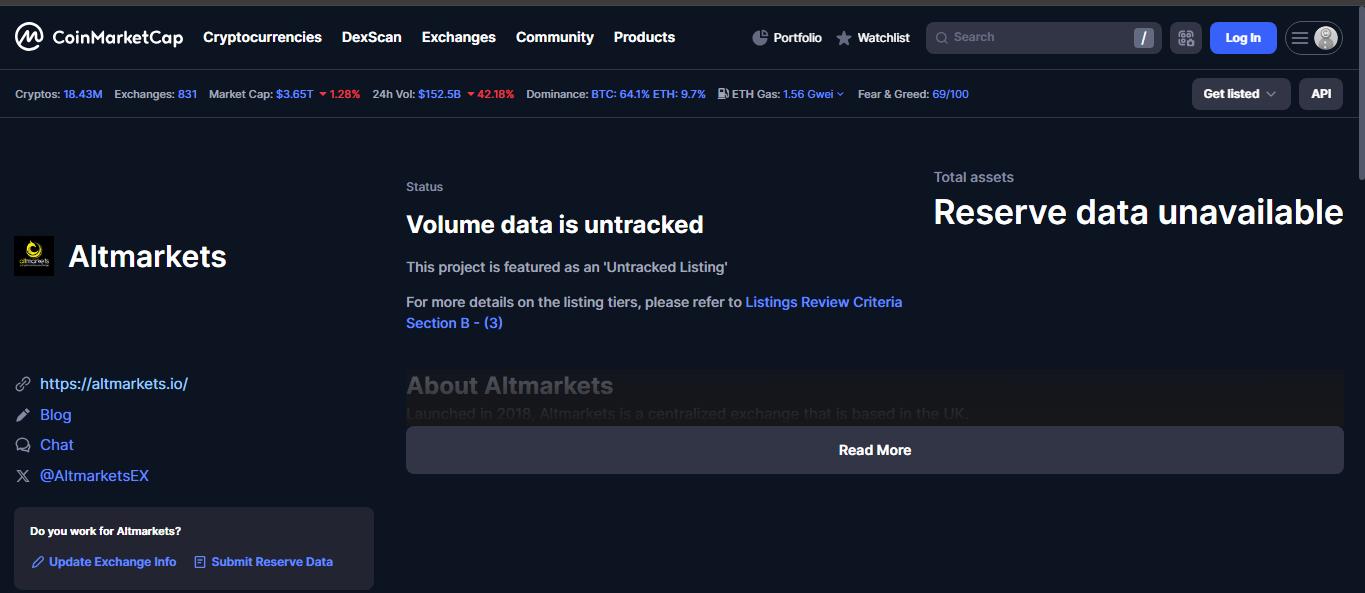AltMarkets Exchange Review - Lightweight Access With Heavy Caveats

Background and current state
AltMarkets emerged around 2018, positioning itself as a no-frills, no-KYC crypto exchange for users in regions often overlooked by mainstream platforms. It claims support for over 20 cryptocurrencies and markets crypto-to-crypto spot trades only. Daily volumes are unclear and likely minimal; this places it outside most mainstream trackers, yet it remains accessible for users seeking anonymity or convenience over compliance.
The platform promotes simplicity: no identity checks, easy sign-up, and a pared-down interface designed for instant trades. But its unregulated status, inconsistent statistics, and complaints about sluggish withdrawals reveal a system built on expediency rather than stability or trust.
At-a-glance comparison
Features and user journey
- Trading is strictly spot-based: users can place market or limit orders across around 20 tokens, including majors and some popular mid-tier altcoins.
- Fees are quoted as a flat percentage, often between 0.15 and 0.25 %, aligning with mid-range fees in this tier.
- Onboarding is friction-free: no KYC, no documents, minimum to zero verification. You sign up with email and are trading within minutes.
- Withdrawal process, however, is another matter: reports describe delays stretching hours or days, slow support, and occasional requests for additional verification after withdrawal attempts.
The appeal is clear: instant access, no identity documents, and a streamlined interface. For casual traders needing quick trades and anonymity, that may be enough. But delay-prone withdrawals and lack of oversight counter those benefits.
Liquidity, volume, and trading conditions
AltMarkets exists in a low-liquidity niche. With no volume data tracked publicly, its order books are likely thin. You may face wide bid-ask spreads and high slippage, especially for even mid-size orders. Price charts exist, but trading activity tends to cluster around illiquid levels. This comes with two consequences:
- High volatility on minor trades.
- Difficulty executing larger orders without heavy cost.
Even a moderate trade can move the market significantly. For high-frequency or large-volume traders, that lack of depth makes the exchange effectively unusable.
Security, transparency, and regulatory posture
AltMarkets operates entirely without regulatory oversight. Deposits go into anonymous hot wallets; no clear proof-of-reserves, insurance, or audits backing them. Security safeguards like SSL, hot/cold wallet splits, or multi-sig are not publicly documented. Two-factor authentication may be offered, but it’s hard to verify without real audits.
Withdrawal delays and anecdotal stories about funds being delayed or lost add to the question: how safe is it to leave funds on the platform overnight, or try to cash out?
User feedback and warning signals
Online forums and community threads show recurring complaints:
- Withdrawal requests taking days, if processed at all.
- Sudden maintenance windows halting access without warning.
- Customer support contact is difficult, slow, or unresponsive.
There's also occasional mention of unexpected wallet resets - cases where balances appear temporarily wiped before returning post-intervention. These patterns fuel distrust, highlighting the fragility of its infrastructure.
Who might use AltMarkets today?
This exchange appeals to a very niche audience:
- Anonymous users from restricted jurisdictions or privacy-oriented individuals.
- Casual traders testing small amounts, unconcerned with professional-grade speed or transparency.
- Crypto tourists curious to compare minor altcoins in a lightweight environment.
What it does not suit:
- Serious traders requiring reliable withdrawal performance.
- Institutions, large traders, or anyone needing oversight.
- Users managing sizable portfolios or trading actively long-term.
Strengths and limitations
Pros
- Fast setup and trading access with no KYC
- Straightforward interface good for beginners
- Flat mid-range fees without volume tiers
Cons
- Withdrawal delays and opaque processing
- Low liquidity leading to slippage and wide spreads
- No audits, reserves, regulatory oversight
- Poor support and operational transparency
- Serious funds carry risk of lock-up or loss
Final take
AltMarkets offers a shortcut into crypto for traders who value privacy over compliance, and speed over resilience. But it does so by skimping on reliability. With no public audit, limited transparency, and anecdotal withdrawal struggles, it feels more like a testbed than a legitimate trading venue.
In 2025, the stakes for exchanges are higher. Even small traders rely on dependable service and transparent operations. AltMarkets might appeal for one-off trades or small tests, but anything above a hobby level should go to platforms with clear accountability, better liquidity, and real-time withdrawal reliability.
If you're looking for rapid, anonymous access and are comfortable trading tiny sums, it may be worth a look. Otherwise, exchanges with no evasive use, clear support, and regulated footing are far safer.
Disclaimer
“This content is for informational purposes only and does not constitute financial advice. Please do your own research before investing.”
.png)







%203.svg)
%203.svg)




















